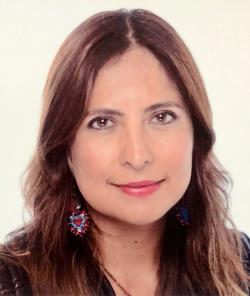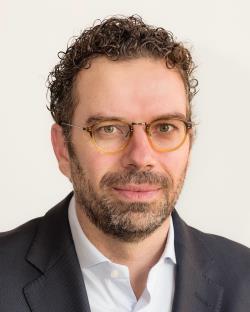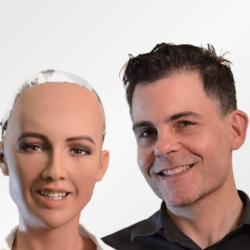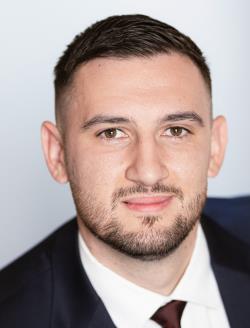fAInance for Good: Harnessing AI to AImprove the Global Financial Systems
ainitiative – to aimprove (y)our future
Session 178
In an era where 1.4 billion adult people remain unbanked* and financial inequality widens, AI offers unprecedented opportunities to re-imagine our financial systems. This high-impact session explores how intelligent technologies can create more equitable, sustainable, and responsible financial ecosystems that directly advance the UN's Sustainable Development Goals.
Building on WSIS+20's commitment to digital transformation, we'll move beyond theoretical discussions to examine real-world applications shaping finance today and tomorrow:
• AI-powered microfinance platforms extending services to marginalized communities;
• quantum-secure blockchain enabling transparent cross-border transactions;
• innovative digital tokens and hardware offering intelligent financial solutions;
• AI-driven impact investments;
• and machine learning systems detecting financial crimes that undermine development.
We’ll examine the vital role of fAInance to reach the 17 SDGs – and also to enable the future work of the UN in financially challenging times. Distinguished experts from diverse stakeholder groups — fintech innovators, AI researchers, development economists, banking experts and academics — will engage in a solution-oriented dialogue. Like in our WSIS-session 2024, a HUMANOID ROBOT panelist will offer provocative perspectives on human-AI collaboration in designing financial systems that prioritize human wellbeing over short-term gains — reimagining how autonomous financial agents might function within value-aligned governance structures.
We will share innovative approaches to distributed financial intelligence that could enable community-controlled banking systems, regenerative economics, and real-time impact measurement for sustainable investments.
We will also discuss critical challenges, including:
• ensuring transparent algorithmic decision-making to prevent bias;
• building new intelligent AI monetary systems;
• developing ethical frameworks for AI deployment in financial services;
• and creating regulatory environments that foster responsible innovation.
Interactive elements will employ live polling on key questions and real-time audience participation through digital platforms, creating an inclusive dialogue on how financial technologies can better serve humanity.
Join us to explore how AI can transform finance from a driver of inequality into a powerful force for achieving the SDGs, ensuring that the digital financial revolution leaves no one behind.
* According the World Bank's Global Financial Inclusion database









-
 C4. Capacity building
C4. Capacity building
-
 C5. Building confidence and security in use of ICTs
C5. Building confidence and security in use of ICTs
-
 C7. ICT applications: benefits in all aspects of life — E-government
C7. ICT applications: benefits in all aspects of life — E-government
-
 C7. ICT applications: benefits in all aspects of life — E-business
C7. ICT applications: benefits in all aspects of life — E-business
-
 C7. ICT applications: benefits in all aspects of life — E-learning
C7. ICT applications: benefits in all aspects of life — E-learning
-
 C7. ICT applications: benefits in all aspects of life — E-employment
C7. ICT applications: benefits in all aspects of life — E-employment
-
 C7. ICT applications: benefits in all aspects of life — E-environment
C7. ICT applications: benefits in all aspects of life — E-environment
-
 C7. ICT applications: benefits in all aspects of life — E-agriculture
C7. ICT applications: benefits in all aspects of life — E-agriculture
-
 C7. ICT applications: benefits in all aspects of life — E-science
C7. ICT applications: benefits in all aspects of life — E-science
-
 C10. Ethical dimensions of the Information Society
C10. Ethical dimensions of the Information Society
-
 C11. International and regional cooperation
C11. International and regional cooperation
Our session connects to several WSIS Action Lines:
- C4 (Capacity Building): We focus on developing AI skills and knowledge in the financial sector.
- C5 (Confidence and Security): We address the importance of secure, trustworthy, and transparent AI solutions in finance.
- C7 (E-business): We highlight innovative digital finance tools that promote financial inclusion.
- C10 (Ethical Dimensions): We discuss ethical standards and transparency for AI in financial systems.
By addressing these areas, our session supports WSIS goals for digital inclusion, responsible innovation and ethical technology use in finance.
-
 Goal 1: End poverty in all its forms everywhere
Goal 1: End poverty in all its forms everywhere
-
 Goal 2: End hunger, achieve food security and improved nutrition and promote sustainable agriculture
Goal 2: End hunger, achieve food security and improved nutrition and promote sustainable agriculture
-
 Goal 8: Promote inclusive and sustainable economic growth, employment and decent work for all
Goal 8: Promote inclusive and sustainable economic growth, employment and decent work for all
-
 Goal 9: Build resilient infrastructure, promote sustainable industrialization and foster innovation
Goal 9: Build resilient infrastructure, promote sustainable industrialization and foster innovation
-
 Goal 10: Reduce inequality within and among countries
Goal 10: Reduce inequality within and among countries
-
 Goal 12: Ensure sustainable consumption and production patterns
Goal 12: Ensure sustainable consumption and production patterns
-
 Goal 16: Promote just, peaceful and inclusive societies
Goal 16: Promote just, peaceful and inclusive societies
-
 Goal 17: Revitalize the global partnership for sustainable development
Goal 17: Revitalize the global partnership for sustainable development
Our session supports the Sustainable Development Process in the following ways:
- Promoting Financial Inclusion (SDG 1: No Poverty, SDG 10: Reduced Inequalities):
By showcasing how AI can expand access to financial services for underserved populations, supporting efforts to reduce poverty and inequality. - Enhancing Transparency and Impact Measurement (SDG 16: Peace, Justice and Strong Institutions, SDG 17: Partnerships for the Goals):
AI tools allow for better tracking and reporting of social and environmental outcomes, helping organizations align with sustainability goals and fostering accountability. - Supporting Climate Action (SDG 13: Climate Action):
We discuss how AI-driven finance can direct investments toward climate solutions and sustainable projects, contributing to environmental sustainability. - Encouraging Responsible Innovation (SDG 8: Decent Work and Economic Growth, SDG 9: Industry, Innovation and Infrastructure):
By emphasizing ethical and responsible use of AI in finance, our session aligns with the broader aim of building fair, resilient and sustainable economies.
Overall, our session demonstrates practical ways that technology and finance can work together to accelerate progress toward the United Nations Sustainable Development Goals.
Relevant Links and Social Media
Session Webpage:
https://www.itu.int/net4/wsis/forum/2025/Agenda/Session/178
Organization Website:
https://ainitiative.net/
Social Media Accounts:
X: [@link to follow]
LinkedIn: [ @link to follow]
Instagram: [@link to follow]
Hashtags:
#FinanceForGood
#AI4SDG
#WSIS2025
.jpeg?maxwidth=2160)